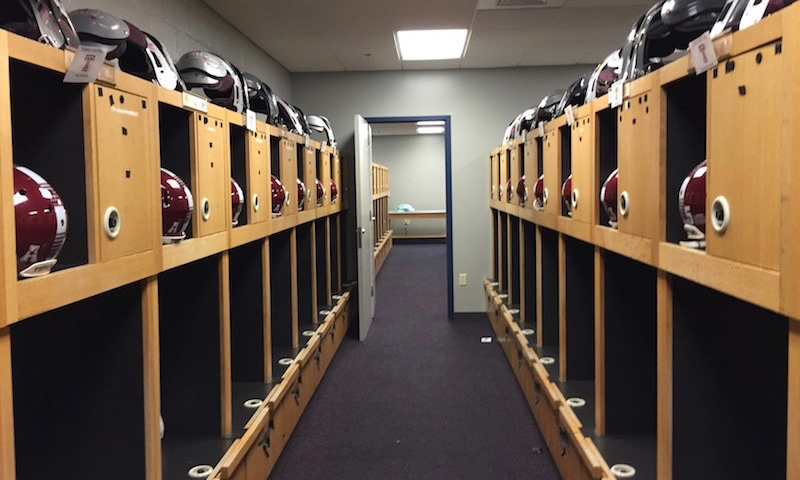This article was originally written by Patrick Engel and appeared in The Daily Campus on December 7, 2015. It has been republished with the author’s permission.
Nathan Vaji takes a minute to relax in his office after completing one of his three or four game day Ford Stadium concourse walkthroughs. He sips on a Styrofoam cup of coffee, already his fifth of the day, and it’s only 1:30 p.m.
“I used to hate coffee,” SMU’s director of operations says. “Until I started working in college athletics. I even hated the smell of it.”
Since today’s game against Temple is a 7 p.m. start, Vaji hadn’t gotten to Ford until around 8:30 a.m. He’s thrilled, because he had a late night the previous night working a men’s soccer game at Wescott Field. For day games, he gets to Ford around 4 a.m. He doesn’t even try to count the amount of coffee he drinks on those days.
Vaji and the other approximately 300 operations staffers don’t concern themselves with the news about the recent NCAA controversy around SMU’s men’s basketball and men’s golf teams or the football team’s 2-10 record. They just want to put on a good game. From equipment preparation to a visiting team that didn’t listen to directions, The Daily Campus went behind the scenes for the Nov. 6 game against Temple.
Vaji stays dressed casually in jeans and an SMU football sweatshirt until about three hours before kickoff, when he changes into khakis, an SMU golf shirt and puts in his earpiece. Around 10:30 a.m., he and his intern, Tyler Kremzar, list the miscellaneous tasks they need to do before the game.
“We try to do as much the day before as we can, because game day always brings something new,” Vaji says.
First up: order a pregame meal for the referees. Vaji grabs his phone and calls Jason’s Deli to place an order for the referees’ lunch: 24 catered sandwiches – eight ham, eight turkey and eight roast beef – to be delivered around 4 p.m., just before the referees will arrive. He says it’s one of about 50 phone calls he takes or makes on game day.
While Vaji continues to cross off the items on his to-do list, the football equipment staff is about to start setting up the locker room and getting the uniforms ready. SMU will wear all red, topped off with red chrome helmets with an American flag Mustang logo. Equipment manager Albert Veytia says that SMU has three different helmets, three different jerseys and three different pairs of pants, which add up to about 30 possible combinations.
Veytia, his three full-time assistants and six student managers do all the work. Some of them spent Thursday pulling jerseys over the shoulder pads and putting the players’ game cleats and pants in their lockers. Others pulled the silver Peruna decal off the chrome helmets and replace it with the American flag one, which Veytia said took a couple hours. On game day, the student managers will pull the rest of the jerseys over the pads and polish the helmets.
“With these chrome helmets, you have to really polish them because you can see fingerprints and smudges all over them,” Veytia, who has worked for three NFL teams, says.
Unlike some NFL teams, the jerseys are all cut the same way, so it takes less than a minute to fit them on the pads. The managers don’t have to worry about fitting a certain player’s jersey tighter or looser to the pads.
“It’s nice to not have to deal with that,” says sophomore student manager John Fraser.
Each of the student managers takes a different part of the locker room to fit the jerseys. They banter back and forth about roommate assignments on the upcoming road trip to Navy while jokingly tossing around Veytia’s catch phrases, “Now we’re working” and “don’t think, just work.”
After the pads, they start polishing the helmets. They spray acetone on the helmet, rub it in with a towel, then spray some floor wax on a towel and rub that on the helmet.
“What kind of alcohol is this?” jokes manager Will Nollmann. “ What happens if it gets in a wound? I don’t know if I should be doing this, I have a cut.”
The managers finish their uniform prep around 4 p.m. and enjoy some Jimmy Johns sandwiches and some leftover Halloween candy. Then, they start bringing practice balls, tees and other miscellaneous warm-up items out to the field. Temple’s equipment team arrived the previous day and has set up the visitors’ locker room already.
Around 4:20, Vaji is barely into his final concourse walk when he gets a phone call. Temple decided to leave their hotel 15 minutes earlier than planned.
“Temple’s going to be here in like five minutes,” Vaji says with a slight hint of frustration, as he’s unable to finish inspecting the concourse.
He stops on a dime and heads back to Loyd All-Sports Center, where the Owls’ buses will arrive. He asked them to pull up along the side of Ford next to Wescott Field and enter the stadium through a side door, because SMU is arriving into Loyd from the Mustang Walk down the boulevard and is hosting a recruiting event in Heritage Hall.
Two state troopers that led Temple’s police escort drive up the curb by Loyd and pull up along the proper side of Ford, but the buses don’t follow. Temple randomly decided to unload its players in front of Loyd and walk around. Vaji crunches his empty Styrofoam coffee cup – his sixth of the day – in frustration. He greets Temple Director of Football Operations Scott Wallace and head coach Matt Rhule, explains the mishap.
Because Temple’s buses stopped in front of Loyd, SMU’s players, who started the Mustang Walk down Bishop Boulevard 15 minutes earlier than scheduled, had to stand and wait after the walk while Temple unloaded. After waiting, SMU enters Loyd and heads down to its locker room as “Jumpman” by Drake blares through speakers. Vaji explains the situation to SMU head coach Chad Morris and director of football operations Randy Ross, then heads back to his office for a quick break. Kremzar, director of event operations Jason Nelson and interns Thomas Kromis and Steve Jameson join him and listen to Vaji explain the mistake. He admits that if he’d known Temple was going to do that, he would have made them wait inside the buses until SMU entered.
Break time is over and the gates are opening to fans soon. After the unloading fiasco, Vaji doesn’t even have time to finish his final concourse walk.
“Alright boys, we gotta go,” he says.
One hundred and five minutes before kickoff, Vaji meets with two of the referees, two ESPN officials, Ross, Wallace and a few others to discuss some of the game essentials. Vaji starts with weather, which is expected to be a non-issue. If bad weather hits, the teams will go to their locker rooms. Cheerleaders and anyone else on the field will go to the football weight room. Fans will go to the concourse.
Vaji tells the refs to tell Casey Cox, the turf manager, if there are any on-field issues. He has direct contact with Vaji.
The final item is TV timeouts. When ESPN wants to go to timeout, someone will come out to the hash marks at the 25-yard line with his arms in an “X” position. That lets the announcers and referees know a full TV timeout is coming. The producer for the game, Bryan Jaroch, explains one wrinkle in televising a Temple game: he may have to take two full commercial breaks after a touchdown, one after the score and one after the ensuing kickoff.
“Temple is a slow, methodical team,” Jaroch says. “They snap it at the end of the clock. If they go on a long drive, I hate to double up, but we may have to.”
The game kicks off at 7:01 p.m., right on time. Temple wins a shootout, 60-40. The 40 points are the most the Owls had allowed on the season. The previous high was 26.

Temple head coach Matt Rhule orders wide receiver Ventell Bryant to do push-ups after scoring a touchdown because he did not like Bryant’s touchdown celebration (photo credit: ESPN).
SMU trailed by only a touchdown entering the fourth quarter, but a 75-yard touchdown pass from P.J. Walker to Ventell Bryant with 12:04 left gave Temple a temporary 14-point cushion. Bryant did a short celebration in which he pretended he was riding a pony. Rhule didn’t like it and made him do push-ups on the sideline right after the touchdown. The video soon went viral.
It’s 11:45 p.m. Vaji is back in his office and has taken care of all of his post-game chores: take down the shuttle and bag policy signs, cover up the concourse TVs and rearrange Heritage Hall for a team lunch the next day. Temple packed up quickly and left about 45 minutes after the game ended, without any issues. Vaji has to stick around until ESPN finishes packing up and leaves. He will get to sleep in, since he doesn’t have to get back on campus until the afternoon for a men’s soccer game. On Sunday, he will start the exhausting process all over again.
“I can’t control what happens on the field or how many touchdowns [SMU] scores, but I can control their experience, their customer service and their overall atmosphere,” Vaji says. “If a fan leaves here, whether SMU gets blown out 45-0 or SMU wins a close game, I want them to leave and look forward to coming back for the next game.”





